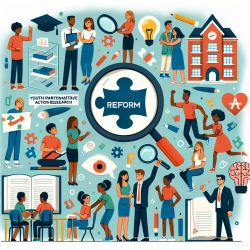Introduction
In the dynamic landscape of education, innovative methodologies are essential to address the diverse needs of students, particularly in continuation high schools. The research article "Implementing Youth Participatory Action Research at a Continuation High School" by Lárez et al. (2023) provides valuable insights into how Youth Participatory Action Research (YPAR) can be effectively implemented to foster student engagement and educational reform.
Understanding YPAR
YPAR is a collaborative approach that empowers students to identify and investigate issues affecting their educational experiences. By integrating research methodology with social justice topics, YPAR encourages students to become active participants in their learning journey. This approach not only enhances academic skills but also promotes critical thinking and social awareness.
Key Findings from the Study
The study conducted by Lárez et al. (2023) at a continuation high school in California highlights several critical outcomes:
- Student Engagement: YPAR methodologies facilitated active student participation, with 66% of enrolled students responding to a student-designed survey.
- Identifying Barriers: The survey revealed that 72% of respondents were responsible for taking care of family members, which impacted their educational progress. Additionally, high rates of depression symptoms were reported.
- Continuity and Cohorts: The use of student cohorts was essential in maintaining continuity over time, ensuring that the research process was sustained and impactful.
Implementing YPAR in Your School
For educators and practitioners interested in implementing YPAR, consider the following steps:
- Develop a Curriculum: Integrate research methodology with topics relevant to students' lives and communities. This approach fosters engagement and relevance.
- Foster Collaboration: Encourage collaboration among students, teachers, and community members to ensure diverse perspectives and comprehensive research outcomes.
- Empower Student Voice: Allow students to lead the research process, from identifying issues to designing surveys and analyzing data. This empowerment builds confidence and agency.
- Address Mental Health: Recognize the importance of mental health support, as highlighted by the study's findings. Providing resources and support can enhance students' ability to engage fully in their education.
Encouraging Further Research
The findings from this study underscore the importance of further research into YPAR methodologies and their impact on educational reform. Practitioners are encouraged to explore how YPAR can be adapted to different educational settings and student populations.
To read the original research paper, please follow this link: Implementing youth participatory action research at a continuation high school.










